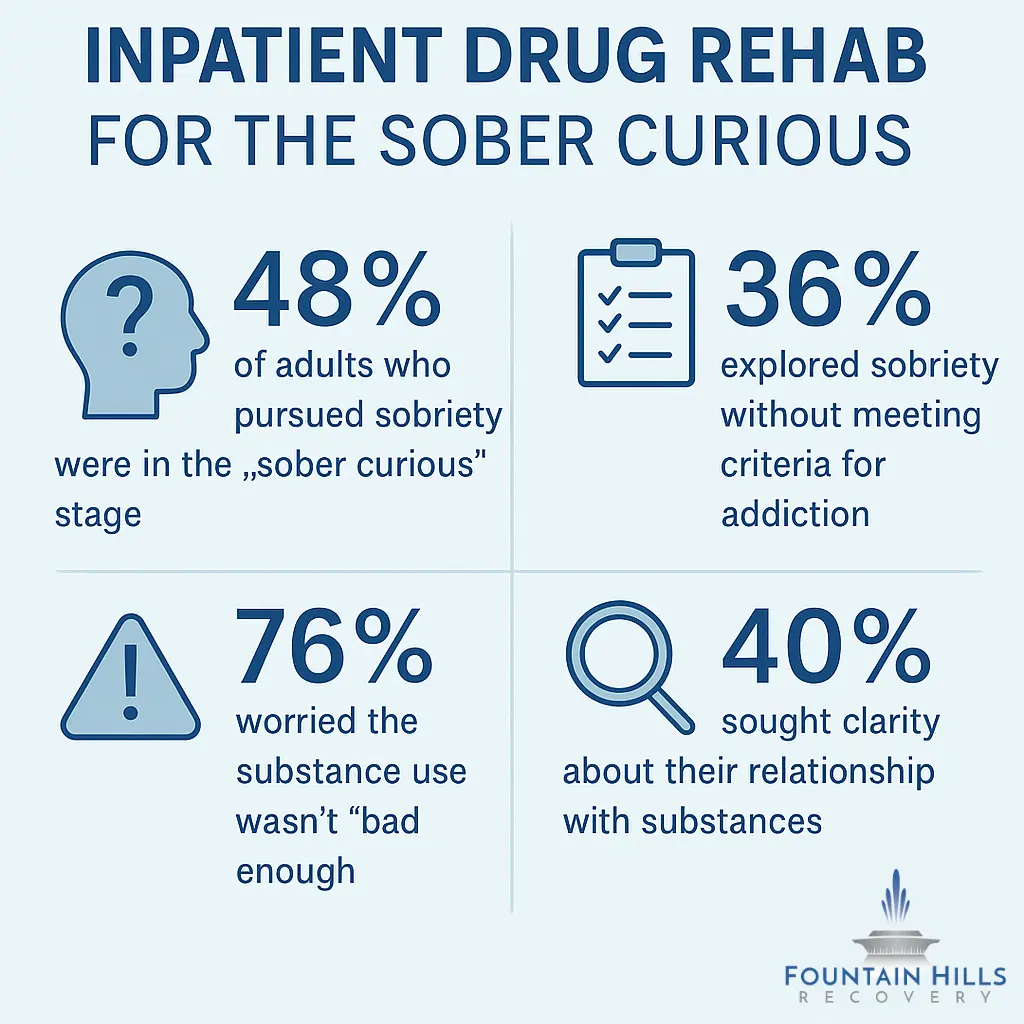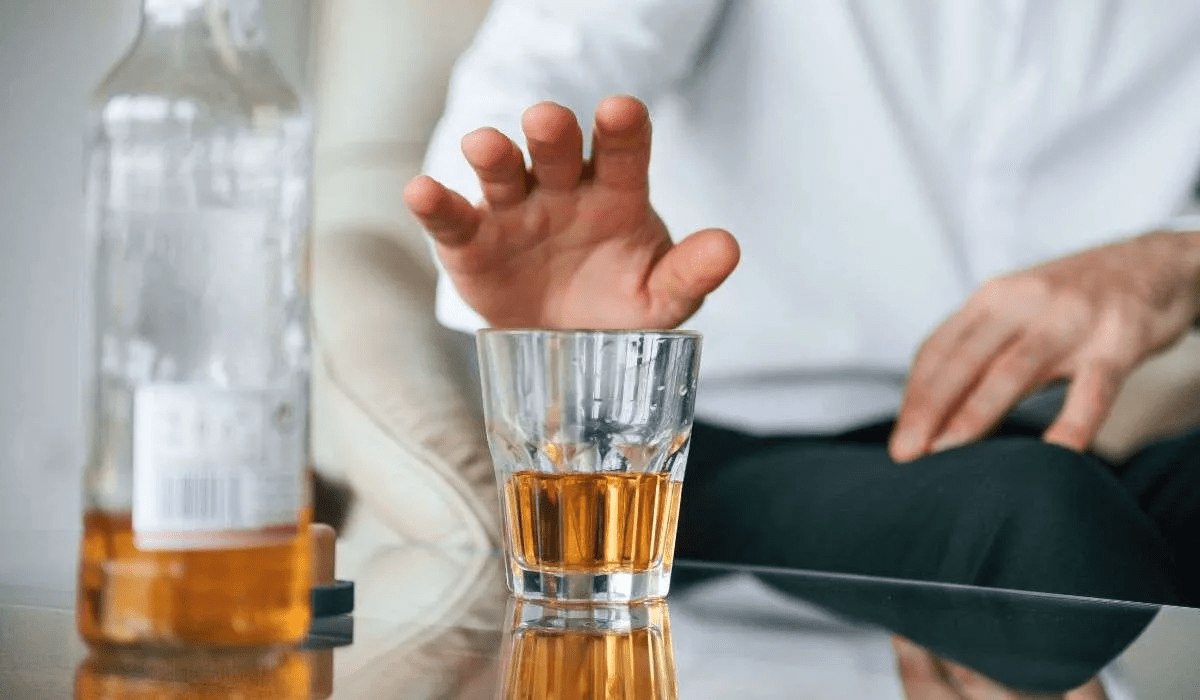You don’t need to hit bottom to ask better questions.
Some people come to rehab after losing everything. Others arrive because they want to stop before it gets there. But there’s also a third group—maybe you’re part of it—that isn’t quite sure what they want. They’re not in crisis. They’re just curious. About who they’d be without substances. About what “sober” really means. About whether they might feel better without the haze.
At Fountain Hills Recovery’s inpatient drug rehab program in Arizona, we welcome that curiosity. Sobriety doesn’t have to be a declaration. It can be an exploration. And inpatient treatment isn’t about forcing a choice—it’s about giving you space to find one.
You Don’t Need to Hit Rock Bottom to Seek Support
Let’s set this straight: you don’t need to “have a problem” in order to want something different.
In our culture, there’s a false idea that help is only for people in total crisis. But emotional pain, burnout, disconnection, or even just a quiet, nagging “this isn’t working” is reason enough to reach out.
Maybe you’ve been drinking more than usual lately, and you’re wondering why. Maybe substances aren’t interfering with your life—but they’re not really adding to it either. That wondering matters.
Inpatient Rehab Creates Breathing Room
The day-to-day rhythm of life can make change hard. It’s easy to fall into default habits: after-work drinks, weekend partying, numbing out with pills or weed. Even if you start to question it, everything around you—friends, routines, stress—pulls you back in.
Inpatient drug rehab creates a pause. You step out of your environment. You unplug from the pressure to keep performing, keep managing, keep pretending. That distance is what lets real insight emerge.
Think of it like climbing to higher ground. You get a better view—not because you’re better, but because you finally have space to look around.
Structure Supports Clarity, Not Control
A lot of sober-curious people worry that going to rehab will mean giving up their agency. “What if they make me do things I’m not ready for?” “What if I get labeled?” “What if I get stuck in a box I don’t belong in?”
That’s not what we do here.
Inpatient rehab at Fountain Hills Recovery is structured—but not controlling. You’ll have daily groups, individual therapy, activities, downtime, and healthy meals. But everything is designed to support your clarity, not override it. We don’t tell you who you are. We ask questions to help you figure it out.
It’s less “stop using forever” and more “what happens when you give yourself a real chance to feel different?”

Exploring Sobriety as a Spectrum
Sobriety isn’t one-size-fits-all. Not everyone who goes to inpatient rehab ends up identifying as an “addict.” Not everyone chooses total abstinence forever. But everyone walks away knowing more.
You might discover:
- That your sleep is deeper without alcohol
- That anxiety you thought was “just part of you” lifts after a few sober weeks
- That you’re calmer, clearer, or more connected when substances aren’t part of the picture
- That you miss less than you thought you would
Or you might learn that some habits are rooted in trauma or stress—not “bad choices.” And now that you know that, you can start addressing the real issue.
You don’t have to commit to being sober forever. You just have to be willing to look.
You’re Not Alone in the Gray Zone
One of the best parts of treatment is realizing that you’re not the only one who doesn’t quite fit the mold.
In group therapy and informal conversations, you’ll meet others who aren’t sure either. Some are testing out sobriety for the first time. Others have come back for a “reset” after years of moderation. Nobody’s path looks exactly the same—but the emotional honesty is what connects everyone.
You’re allowed to be unsure. You’re allowed to change your mind. You’re allowed to ask questions out loud.
Clinicians Who Listen Before They Label
At Fountain Hills Recovery, at Scottsdale, Fountain Hills, our clinicians approach you with curiosity—not assumptions.
We don’t lead with a diagnosis. We don’t expect you to explain your drinking in a specific way. Instead, we start with:
“What brought you here?”
“What are you noticing in your life right now?”
“What would you like to feel more—or less—of?”
Whether you want to explore moderation, understand your habits, or take a full break from substances, we’ll help you build a plan that honors your goals.
You’re Allowed to Just Be Curious
There’s a quiet kind of courage in choosing to look at something before it breaks.
Inpatient rehab can feel intimidating if you think it’s only for people in crisis. But it’s also for people who want to understand themselves better. People who wonder if there’s more to life than this half-present fog. People who are asking, “What if I gave myself the chance to feel fully alive?”
If that’s you, we’re here for it.
FAQ: Inpatient Rehab for the Sober Curious
Do I have to commit to long-term sobriety to enter inpatient rehab?
No. You don’t need to commit to lifelong sobriety to enter our program. Many people come to inpatient rehab simply to take a break, get clarity, and explore what sobriety feels like. You’re allowed to come in with questions, not answers.
What if I don’t think I have a “real problem”?
If you’re questioning your relationship with substances, that is enough. You don’t need to prove a certain level of harm or dysfunction. Inpatient rehab can help you understand your patterns—even if they haven’t caused a crisis.
Will I be labeled as an addict?
No. Our approach is person-centered and nonjudgmental. We don’t label you. We listen to you. Your experience, goals, and values shape your treatment—not assumptions or stigma.
Is it weird to go to rehab if I’ve never “hit bottom”?
Not at all. In fact, many of our most engaged and successful clients came to us because they didn’t want to wait until things got worse. Seeking support early is a strength—not a sign of weakness.
What’s a typical day like in inpatient treatment?
You’ll have a mix of individual therapy, group sessions, activities like mindfulness or fitness, meals, rest time, and optional recovery-based education. Every day is structured to help you feel more grounded, not overwhelmed.
Call (800) 715-2004 or visit Fountain Hills Recovery’s inpatient drug rehab page to learn more. Whether you’re sober curious or ready to take a deeper step, we’ll meet you where you are—with respect, warmth, and zero pressure.




